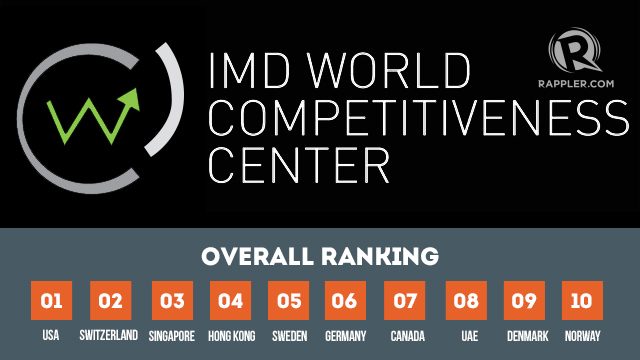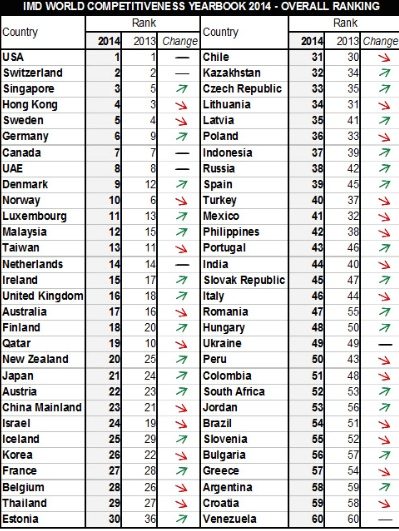SUMMARY
This is AI generated summarization, which may have errors. For context, always refer to the full article.

MANILA, Philippines – After climbing 5 notches to 38th spot last year, the Philippines has slid to 42nd place in the 2014 IMD World Competitiveness Yearbook Ranking, highlights of which were released on Thursday, May 22.
The IMD World Competitiveness Center announced its annual world competitiveness ranking based on the perceptions of 60 economies as a place to do business.
Watch this report below.
The United States continues to lead the pack.
“The overall competitiveness story for 2014 is one of continued success in the US, partial recovery in Europe, and struggles for some large emerging markets. There is no single recipe for a country to climb the competitiveness rankings, and much depends on the local context,” said Arthur Bris, director of the IMD World Competitiveness Center.
Bris also said that “how executives feel their country is being perceived is a potentially useful guide to future competitiveness developments there.”
“While economic performance changes from year to year, perceptions are longer-term and shift more gradually. They can also lead to a virtuous circle of better image and better economic performance,” he said.
The top 10 are:
- United States
- Switzerland
- Singapore
- Hong Kong
- Sweden
- Germany
- Canada
- United Arab Emirates
- Denmark
- Norway
Emerging markets, PH challenges
IMD said in a statement that most big emerging markets “slide in the rankings as economic growth and foreign investment slow and infrastructure remains inadequate.”
It said that China falls to 23 in 2014 from 21 in 2013 “partly owing to concerns about its business environment” while India’s ranking slips to 44 from 40, and Brazil to 54 from 51 due to “inefficient labor markets and ineffective business management.”
Aside from the Philippines, other emerging economies also rank lower this year compared to last year, such as Turkey (40 from 37), Mexico (41 from 32), and Peru (50 from 43).

Citing data from the Asian Institute of Management Policy Center, IMD enumerated the the challenges facing the Philippines in 2014:
- Infrastructure: Many roads are unpaved, public transportation is inefficient, and the primary airport is operating beyond capacity
- Corruption: Improvements in governance are being made but still a long way to go
- Unemployment and underemployment: Rates are one of the highest in the ASEAN
- Undeveloped financial system: Access to finance is one of the greatest challenges facing small and medium firms
- Natural disasters: Typhoons, rains, and earthquake caused major damage in 2013
From a list of 15 indicators, respondents in its Executive Opinion Survey – conducted among 4,300 international executives – were asked to select 5 they perceived to be the key attractiveness factors of their economy.
In the Philippines, the top 5 are the country’s skilled workforce, 80%; high educational level, 72.7%; dynamism of the economy, 54.5%; cost competitiveness, 50.9%; and open and positive attitudes, 50.9%.
Next are quality of corporate governance, 30.9%; policy stability and predictability, 23.6%; effective labor relations, 20%; access to financing, 20%; and business-friendly environment, 18.2%.
The bottom 5 are competency of government, 12.7%; competitive tax regime, 9.1%; effective legal environment, 7.3%; reliable infrastructure, 7.3%; and strong research and development culture, 3.6%
Other economies
On the perception of other countries, IMD said Japan’s weaker currency has helped improved its competitiveness abroad, raising it to 21 this year from 24 in 2013.
Elsewhere in Asia, both Malaysia (12 from 15) and Indonesia (37 from 39) make gains, while Thailand (29 from 27) falls amid political uncertainty, it said.
The IMD said that the US’ top ranking reflects “the resilience of its economy, better employment numbers, and its dominance in technology and infrastructure” while Switzerland, Singapore and Hong Kong “continue to prosper thanks to exports, business efficiency and innovation.”
Europe’s “gradual economic recovery” has helped Europe fare better in 2014 than in 2013.
The IMD, a global business school based in Switzerland, said its IMD World Competitiveness Yearbook, to be published at the end of June, measures how well countries manage all their resources and competencies to increase their prosperity.
It said that the 2014 competitiveness ranking is based on 300 criteria, two-thirds based on statistical indicators and a third on an exclusive IMD survey of 4,300 international executives. – Rappler.com
Add a comment
How does this make you feel?
There are no comments yet. Add your comment to start the conversation.